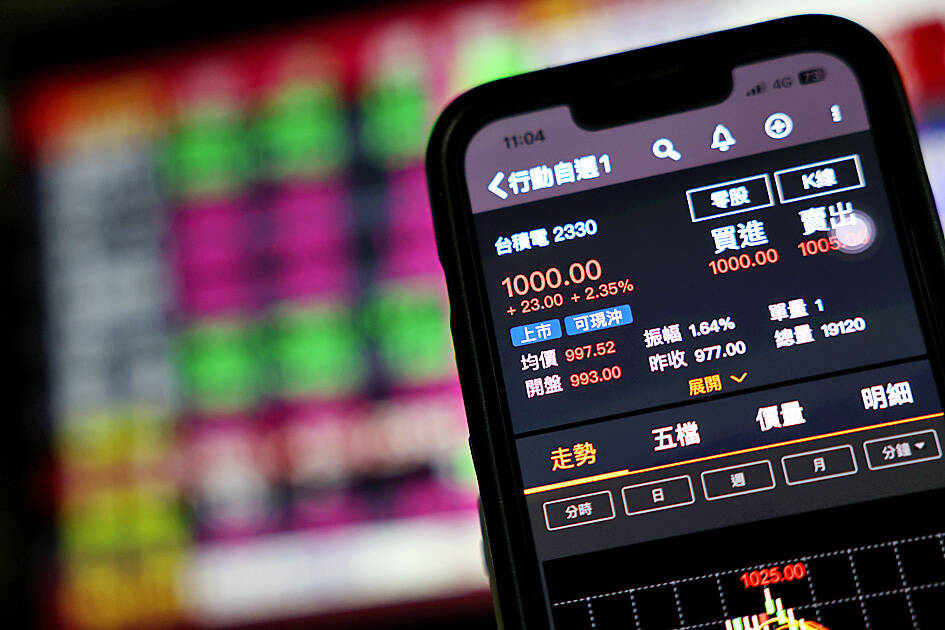Foreign investors are sitting on billions of dollars of cash in Taiwan, an encouraging sign for equity bulls predicting that a recent market decline would be short-lived.
Global funds sold US$16.9 billion of shares on a net basis on the Taiwan Stock Exchange between January and last month, but they still injected US$29.5 billion of capital into the nation on a net basis during the same period, suggesting that despite recent profit taking, they still have plenty of cash to invest in Taiwanese stocks.
“The increasing foreign capital in Taiwan indicates foreign investors are still bullish on Taiwanese stocks and will likely seek a good window to gain positions again,” Edmond de Rothschild Asset Management fund manager Xiadong Bao (包夏東) said in Paris.

Photo: CNA
The dry powder available to foreign investors shows how quickly money might flow back into Taiwanese stocks that have benefited from the artificial intelligence (AI) boom, including Taiwan Semiconductor Manufacturing Co (TSMC, 台積電), the world’s leading contract chipmaker, and Hon Hai Precision Industry Co (鴻海精密), a crucial supplier to Apple Inc. The two stocks surged during the first half of this year, but have since lost momentum amid worries about the sustainability of the AI investment rush.
The local benchmark TAIEX is up 26 percent this year, despite falling after hitting an all-time high in July. That is a better performance than regional peers such as South Korea and Japan, although it has been eclipsed by Hong Kong following the recent buying frenzy in Chinese shares.
The TAIEX ended up 399.85 points, or 1.79 percent, at 22,702.56 yesterday.
Investors are now closely watching earnings from Taiwanese companies to see whether spending on AI is still providing big revenue growth for tech manufacturers.
TSMC is set to report its third-quarter results on Thursday next week, while Hon Hai, also known as Foxconn Technology Group (富士康科技集團), is to brief investors on Nov. 14.
Taiwan has been an attractive market for global investors and net inflows from overseas funds hit US$275 billion on a cumulative basis last month. That was just a tad below June’s record high since Bloomberg began tracking the data in 2007, after the pace of inflows slowed in the second half.
The recent rally in Hong Kong and China might lead to “some near-term rotation from TAIEX to China,” Allspring Global Investments portfolio manager Gary Tan said.
It does not alter his overall optimism on Taiwanese stocks, Tan said, adding that he wants to gain more exposure to TAIEX as the valuation gap between Taiwan and China narrows.
The TAIEX trades at 16.2 times forward earnings estimates. While it is still slightly above its five-year average, the level is down from about 20 times projected earnings in July.
“Ultimately, I think that investors will pay for growth and the TAIEX has hitched itself to the winning AI horse,” Invesco Asset Management strategist David Chao (趙耀庭) said.

Intel Corp chief executive officer Lip-Bu Tan (陳立武) is expected to meet with Taiwanese suppliers next month in conjunction with the opening of the Computex Taipei trade show, supply chain sources said on Monday. The visit, the first for Tan to Taiwan since assuming his new post last month, would be aimed at enhancing Intel’s ties with suppliers in Taiwan as he attempts to help turn around the struggling US chipmaker, the sources said. Tan is to hold a banquet to celebrate Intel’s 40-year presence in Taiwan before Computex opens on May 20 and invite dozens of Taiwanese suppliers to exchange views

Application-specific integrated circuit designer Faraday Technology Corp (智原) yesterday said that although revenue this quarter would decline 30 percent from last quarter, it retained its full-year forecast of revenue growth of 100 percent. The company attributed the quarterly drop to a slowdown in customers’ production of chips using Faraday’s advanced packaging technology. The company is still confident about its revenue growth this year, given its strong “design-win” — or the projects it won to help customers design their chips, Faraday president Steve Wang (王國雍) told an online earnings conference. “The design-win this year is better than we expected. We believe we will win

Chizuko Kimura has become the first female sushi chef in the world to win a Michelin star, fulfilling a promise she made to her dying husband to continue his legacy. The 54-year-old Japanese chef regained the Michelin star her late husband, Shunei Kimura, won three years ago for their Sushi Shunei restaurant in Paris. For Shunei Kimura, the star was a dream come true. However, the joy was short-lived. He died from cancer just three months later in June 2022. He was 65. The following year, the restaurant in the heart of Montmartre lost its star rating. Chizuko Kimura insisted that the new star is still down

While China’s leaders use their economic and political might to fight US President Donald Trump’s trade war “to the end,” its army of social media soldiers are embarking on a more humorous campaign online. Trump’s tariff blitz has seen Washington and Beijing impose eye-watering duties on imports from the other, fanning a standoff between the economic superpowers that has sparked global recession fears and sent markets into a tailspin. Trump says his policy is a response to years of being “ripped off” by other countries and aims to bring manufacturing to the US, forcing companies to employ US workers. However, China’s online warriors